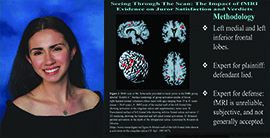 2021Grand Prize: Isabella Souza
2021Grand Prize: Isabella Souza

Isabella Souza was named a 2021 top 300 Regeneron Science Talent Search Scholar and competed at the 2021 Regeneron International Science and Engineering Fair where her research, “Seeing Through the Scan: The Impact of fMRI Evidence on Juror Satisfaction and Verdicts” received an Honorable Mention from the American Psychological Association.
Currently, the literature concerning the “sway” power on jurors of fMRI evidence is lacking. This comes just as the technology is increasingly being proffered in all forms of litigation forums - both criminal and civil. Compound this issue with the fact that there really isn’t a consensus among the scientific community over the reliability of fMRI use for lie detection purposes, and our public defenders are left with warrantless pleas to prevent the evidence from being entered into the record.
 Isabella's Research Work
Isabella's Research Work
Her work, in proffering some grounds for potential “scientific bias” risk, would allow attorneys and judges to recognize a legitimate reason for rejecting these data or even provide reason for judges to be more skeptical of its entrance into the record, because as it stands, judges themselves are also subject to the “scientific allure” conjured by computer-simulated graphics like fMRI, and therefore, may simply be uninformed of its potential to subconsciously sway and limit the truth-determining role of jury members.
As with most breakthroughs, sharing her findings with the academic community - namely legal scholars and those called to testify as expert witnesses alike - would help to facilitate this process. She initially became interested in this literature after her years spent practicing evidence suppression hearings as lead attorney of her Mock Trial team.
There, having jumped to consider the information in graphs as fact before, she became concerned about jurors lending too much credence towards claims without the surmounting acceptance of the rest of the scientific community.
 Other Activities
Other Activities
Outside this work she is bridging the gap between education and modern student mental health concerns, founding and chairing her school’s first Advisory committee which facilitates a direct line of communication between students and school administration on issues of workload intensity, quality of peer interactions, and formulation of stress-management curriculum.
She has hosted town halls with New York State representatives on mental health related school policy. She has additionally authored a self-care book, Self-made Self-care for the Teenager, for teens, which has led her to present to leading researchers at Active Minds, the Jed Foundation, and the Healthy Minds Network at the University of Michigan School of Public Health.
She was recently named a National Hispanic Scholar, an HSF Scholar, and an Academic All American
She will be attending Columbia University next fall where she plans to study Neuroscience and Behavior.